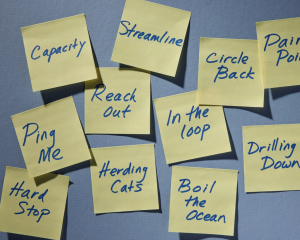For something designed to streamline communication, corporate jargon often does the opposite -- leaving many employees confused, excluded, or just plain annoyed.
盡管企業行話旨在簡化溝通,但其效果往往適得其反--讓許多員工感到困惑、被排斥,甚至心生厭煩。
A survey of more than 8,000 working professionals across eight countries found that 58 percent feel their fellow employees overuse jargon.
一項針對八國8000多名職場人士的調查顯示,58%的人認為同事過度使用行話。
If given the opportunity, nearly half of them would eliminate its usage since deciphering their meanings "causes stress and slows down productivity."
若有機會,近半數受訪者會徹底廢除行話,因其含義晦澀“既造成壓力,又降低工作效率”。
Yet, we persist. Even fictional workplaces like Severance's Lumon Industries parody the language of modern employment -- with their Office Retreat Team Building Occurrences and waffle parties -- because it's all too recognizable.
然而我們仍在堅持使用。即使是虛構職場如《人生切割術》中的盧蒙工業,也在諷刺現代職場語言--他們的“辦公室靜修團隊建設活動”和華夫餅派對--正是因為這些場景太過真實。
So, what keeps us looping in and syncing up? What does this evolving vocabulary actually do for us, and why does it endure?
那么,是什么讓我們不斷“循環”和“同步”?這種不斷演變的詞匯究竟對我們有何作用,為何能經久不衰?
Language isn't just about sharing information; it's social, says Daria Bahtina, a lecturer from the University of California Los Angeles' linguistics department.
加州大學洛杉磯分校語言學系講師達里亞·巴蒂娜指出,語言不僅是信息傳遞工具,更是社交媒介。

"When we speak, we're not only passing facts back and forth, we're performing relationships, identities, affiliations, and stances," she says.
“當我們說話時,不僅在交換事實,更在塑造關系、身份、歸屬感和立場。”她說。
Corporate jargon is a natural by-product of people working together toward a shared goal -- even if that goal is surviving a Monday morning meeting.
企業行話是人們為共同目標協作的自然產物--即便這個目標只是熬過周一晨會。
This isn't limited to managers or corporate departments.
這種現象不限于管理層或企業部門。
Bahtina says specialized language pops up wherever people gather: in a team of software engineers, a hospital triage unit, or even a neighborhood book club after their third bottle of wine.
巴蒂娜表示,任何人群聚集處都會產生專業用語:軟件工程師團隊、醫院分診處,甚至社區讀書俱樂部喝到第三瓶酒后。
Our lexicon of choice has always spoken to who we are and what we're trying to make sense of as a collective.
我們選擇的詞匯始終反映著我們是誰,以及我們作為一個集體的認知訴求。
"Language follows behavior," Bahtina says. "We change how we work, how we live, how we relate -- and then, we create the words to talk about that change."
“語言跟隨行為變化,”巴蒂娜說,“我們改變工作、生活和交往方式后,才會創造相應的詞匯來描述這些變化。”
For example, workplace jargon in the early 20th century maximized production, precision, and accuracy, essential values during rapid industrialization.
例如,20世紀初的職場行話強調生產效率、精準度和準確性,這與當時快速工業化進程中的核心價值觀高度契合。
By the 2010s, a different set of priorities emerged, shaped by the rise of fourth-wave feminism and social movements.
到2010年代,隨著第四波女權主義和社會運動興起,出現了一組不同的優先事項。
Terms like terms like "DEI," "unconscious bias," and "inclusive leadership" entered the mainstream.
“DEI(多樣性、公平性、包容性)”、“無意識偏見”、“包容性領導”等術語進入主流話語體系。
Even today, TikTok-viral terms like 'quiet quitting' and 'coffee badging' popularized by a post-pandemic, hybrid workforce signal a culture still negotiating what work means.
直至今日,TikTok上流行的“在職躺平”和“咖啡打卡”等熱詞,經由疫情后混合辦公模式的推波助瀾,仍在反映職場文化對工作定義權的爭奪。












